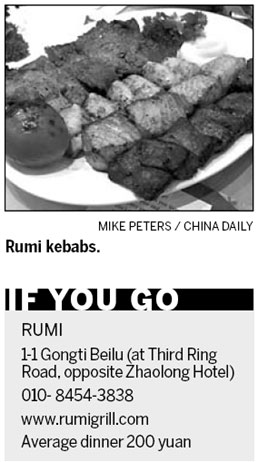Pure Persian, with style
Updated: 2012-03-04 07:50
By Mike Peters (China Daily)
|
|||||||||||
Beijing
White, spacious and chic, the high-ceilinged dining room immediately shatters the gloomy caricature of Middle Eastern restaurants. Lively Persian music, with all the drama of Rumi's mystical poetry, discreetly fills the space.
But if the elegant ambience beckons from the restaurant's expansive windows, it's the food that commands return visits from Rumi's regular customers. "Best lamb kebabs in town" has been a mantra of dining reviews and reader surveys in capital-city magazines.
Why are they so good? We couldn't wheedle the secret from the amiable manager, Faribourz. But the lamb sirloin is fork-tender, impossibly lean and grilled on steel skewers after what our taste buds speculate is a marinade powered by yoghurt and lemon and "secret spices".
|
|
If lamb is not your thing, the kitchen's skill at marinating and grilling makes memorable kebabs of chicken, beef and seafood, too.
Tempting as it is to head straight for these, there's an array of intriguing flavors to sample on the way to the main course.
Fragrant and colorful spices kiss salads and starters: sumac in the tart shirazi salad of chopped cucumbers and tomatoes, paprika on the savory hummus.
The rich lentil soup invites lingering over, except it would be a sin to let it get cold. Saffron blooms all over the menu, from rice to desserts.
And while fans rave about the kebabs online, it's the Persian stews that really set Rumi apart.
On my recent visit to the Iranian city of Esfahan, the visual thrill of the 16th-century capital's lovely bridges and buildings was only matched by my introduction to fesenjen.
A stew of chicken, pomegranate puree and walnuts, its preparation requires slow cooking and careful monitoring to keep the flavors balanced and the walnuts from making the dish oily.
I've sampled pretty fair copies of this Persian classic in restaurants around the world, but Rumi's rendition is closest to my first romantic encounter in Esfahan.
Other stews revel in sour flavors: gormeh sabzi marries greens with kidney beans and beef, while a tangy tomato broth gives a kick to a rich shrimp stew.
The lunchtime buffet (88 yuan, $14) always offers at least one of these more exotic dishes, so you can have these and the famous kebabs, too. The regular menu includes about a dozen stews with lots of different vegetables and seasonings.
Internet critics, and there are some, occasionally fret about the service.
While the staff members can be as serene as the decor, I've always found them attentive and pleasant whether I'm lunching with a friend or dining with a large group.
Some Chinese servers don't know as much as you'd expect about the more exotic items on the menu, but the pictures and descriptions are good, so gambles usually hold few real surprises.
Servers are discreet but obliging about the matter of alcohol. The management is of the Ba'hai faith, and many in the Iranian clientele - like many Middle Easterners - are strict Muslims. But while the restaurant doesn't sell beer and wine, the staff is happy to open a bottle of vino for your table if you bring one.
You may contact the writer at michaelpeters@chinadaily.com.cn.
China Daily
Today's Top News
Rescuers race against time for quake victims
Telecom workers restore links
Coal mine blast kills 18 in Jilin
Intl scholarship puts China on the map
More bird flu patients discharged
Gold loses sheen, but still a safe bet
US 'turns blind eye to human rights'
Telecom workers restore links
Hot Topics
Lunar probe , China growth forecasts, Emission rules get tougher, China seen through 'colored lens', International board,
Editor's Picks

|

|

|

|

|

|






